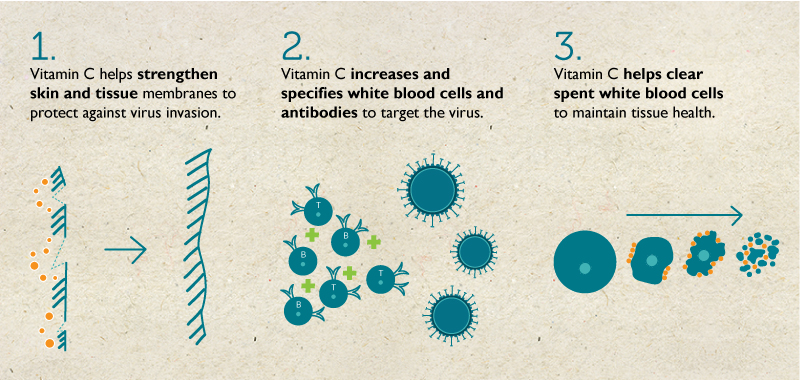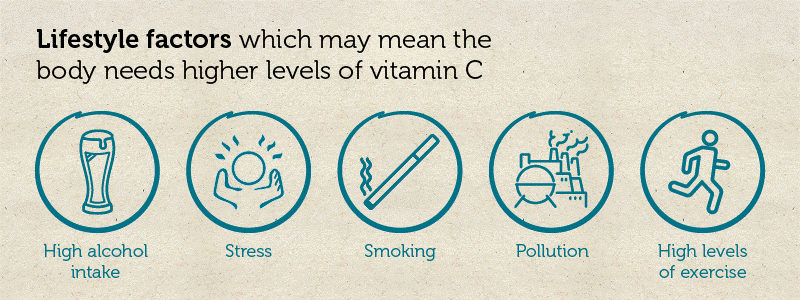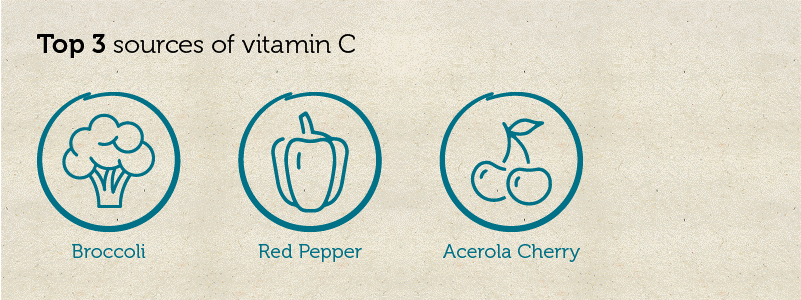
Vitamin C. Immunity and so much more
It’s hard to talk about Vitamin C without mentioning Immunity. But did you know the power of vitamin C goes beyond strengthening the immune function and its health benefits are well-recognised by the scientific community? Find out more about this invaluable nutrient from Viridian’s Director of Nutrition Aimee Benbow.
Vitamin C for Immunity
Vitamin C, probably one of the most notable vitamins, is an essential nutrient for the immune system. Proven to support the body in fighting off pathogens like colds and flu, It has been shown to inhibit viral replication and can have a beneficial impact when taken at high doses at the start of a virus to reduce the duration of symptoms.1
Vitamin C works in 3 ways to support the immune system:
1) It boosts collagen synthesis to strengthen skin and tissue membranes (so the virus can’t enter as easily)
2) it increases and specifies white blood cells and antibodies to target the virus
3) it helps clear spent white blood cells to maintain tissue health.

Vitamin C boosts skin strength; increases white blood cells & antibodies; helps to maintain tissue health
Vitamin C – additional health benefits
It is not just needed for immunity though. As mentioned above, Vitamin C is essential for collagen formation. Collagen, often trumpeted with beauty benefits, keeps skin looking good by maintaining its structure. It also provides cardiovascular protection by helping arteries stay strong which are vital to get oxygenated blood around the body. A high dietary intake of vitamin C has been shown to significantly reduce the risk of death from heart attacks and strokes in numerous population studies2. The health of your cardiovascular system may not be easily noted but signs of weakened collagen structures include bruising, muscle weakness, gum deterioration, and poor wound healing.
Vitamin C is, additionally, a powerful antioxidant, protecting cellular structures from free radicals which can be caused by environmental impacts, toxins, ageing and lifestyle. Smoking in particular has a negative impact and the National Institutes of Health in the US recommend an additional intake of 35mg/day for those who smoke.3

Lifestyle factors which may mean the body needs higher levels of vitamin C include high alcohol intake; stress; smoking; pollution; high levels of exercise
So vitamin C is a crucial nutrient but how do we ensure we get the right amount? Humans, unlike almost all animals, can’t make vitamin C, so we have to get it from our diet. Animals can synthesise ascorbic acid from glucose whereas a genetic change which occurred centuries ago in humans prevents us from making it. The food that is famously known as a good source of vitamin C is oranges. Whilst they do contain vitamin C and are a great source of other nutrients as well, you would have to eat around 17 oranges to get 1000mg of Vitamin C!
Interestingly there are other foods that are much more nutrient dense in this vitamin. Acerola Cherry for example is one of the richest known natural sources of vitamin C. In comparison, 100g of orange provides approx. 55mg of Vitamin C, whereas 100g of acerola cherries provides 1680mg of Vitamin C – that’s 30 times more.4 Leafy green vegetables are also another rich source so filling your plate with these will definitely increase your vitamin C intake.

Top sources of vitamin C include Broccoli; Red Pepper and Acerola Cherry
If you feel you can’t get enough vitamin C easily from your diet, you might consider supplementation. As vitamin C is water soluble, your body excretes any excess it doesn’t need although if you do consume an excessive amount, you might notice some laxative effects. Taking a buffered vitamin C can help avoid gastrointestinal discomfort caused by the acidity of standard ascorbic acid.
For more information come into store or contact us 0208 343 1002
References
1, Van Straten M, Josling P. Herbal Health Centre, Battle, East Sussex, United Kingdom. Preventing the common cold with a vitamin C supplement: a double-blind, placebo-controlled survey. Adv Ther 2002 May-Jun;19(3):151-9
2, Ness, A.R., Powles, J.W. and Khaw, K.T., 1996. Vitamin C and cardiovascular disease: a systematic review. Journal of cardiovascular risk, 3(6), pp.513-521.
3, Institute of Medicine (US) Panel on Dietary Antioxidants and Related Compounds. Dietary Reference Intakes for Vitamin C, Vitamin E, Selenium, and Carotenoids. Washington (DC): National Academies Press (US); 2000.5, Vitamin C. Available from: https://www.ncbi.nlm.nih.gov/books/NBK225480/
4, U.S Department of Agriculture. Food Data Central. https://fdc.nal.usda.gov/index.html.
The information contained in this article is not intended to treat, diagnose or replace the advice of a health practitioner. Please consult a qualified health practitioner if you have a pre-existing health condition or are currently taking medication. Food supplements should not be used as a substitute for a varied and balanced diet.
